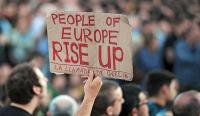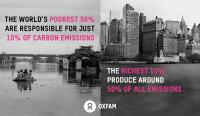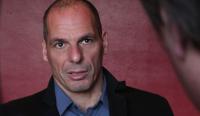In Britain, there has been a switch to a „gig economy“ where people pretend to be freelancers, competing under ever worse conditions in a „war of all against all“. After the Labour Party had joined the neoliberal agenda under Tony Blair in the 1990s, no real political choice was left to the majority of Britons for decades. The EU referendum was then used as a „kick at the establishment“. However, Brexit could turn out as a disaster for the majority of British citizens. The three billionaires who own most of the British press for example are pushing for a hard Brexit in order to achieve a regulation vacuum and closer ties to the deregulated US economy.
George Monbiot, columnist with the Guardian und author of Heat: How to Stop the Planet Burning and Out of the Wreckage. A New Politics for an Age of Crisis
Fabian Scheidler: Britain has been at the forefront of neoliberal politics for decades and since the financial crisis in 2008 even more severe austerity measures were imposed. How has Britain changed since then and what is the social situation and what does all this have to do with the rise of the right and with Brexit also.
George Monbiot: Well, we live in a pretty desperate and polarized nation where social mobility has stalled pretty well completely, wages have stalled for the majority of people, there’s a big switch towards what we call the gig economy people are being forced to pretend that they’re freelancers when they’re really still working for the company they were working for before, where we get pushed into a kind Hobbesian world where we are treated as if we are all at war with everyone else, but also we end up at war with ourselves because we become our own slave drivers pushing ourselves to fulfill these impossible terms of service which are which we have to meet in order to retain our gigs with whatever company claims to be employing us. And this brings a huge amount of anger and resentment, particularly when we have had years without effective political choice. Now I think with the way Labour is moving, we are beginning to recover some degree of political choice but unfortunately it's in one respect to late because we’ve already taken this fateful step. As a result, the first really big choice that we've had for a very long time was the European referendum where we were given a choice of sticking with things as they are or taking a massive kick at the establishment, a massive kick at something at any rate, and what are you going to do? Are you going to use this enormous power you’ve just been given or are you going to say “Oh, no thanks, I won’t use it”? Well, you’re going to use it, of course. If you’d voted for remain, you vote for the whole system to stay as it is, but if you vote for leave well hey you vote for something to change. Whatever it might be. So now when you would hope we would have a chance of some real massive political change, progressive change, instead, we are completely buried in what promises to be an interminable discussion about Brexit, which could lead to total disaster for most of the people in this country, a great boon for dirty industries because we’ll suddenly find ourselves in a regulation vacuum. Terrifying prospects and unfortunately no other issue gets look-in at the moment. There are so many things I want to talk about but people can't give it the attention that these issues might deserve because everybody is staring like rabbits in the headlights of this oncoming truck which is this terrifying prospect that we will leave the European Union not just leave it but leave it without even having a deal. And we’re just going to plunge straight into chaos.
Fabian Scheidler: Your colleague Tom Whyman recently wrote in the New York Times “One way of understanding the whole Brexit phenomenon would be as a distraction from talking about any of Britain's real problems. The real problems being the effect of austerity.” What is your comment. Is it just a distraction and is the EU just a kind of bogeyman for all the problems created internally?
George Monbiot: Well, it's very interesting whenever you see people surveyed as to why they want to leave they’ll say well it's all those rules is all those rules imposed on us by Europe. And when people are asked which rules do you, the go “Er… Well, you know, the rules.” They literally cannot name a single rule. And there is an interesting analysis of the whole legislative body published recently, all the current laws in the UK which has 40-off thousand, 4000 of which are European laws, 72 of which were opposed by the UK. All the rest we accepted, we’re fine. The government accepted. 72 of those rules were opposed. And they’re all rules about holding corporations to account. It’s all about “no you can’t produce all that sulfur dioxide from your coal burning power station” or “no, you can't use that exotic financial instrument which threatens to destroy the whole economy.” Not a single one of those rules is harmful to the ordinary people of Britain. They might affect the behavior of a very small handful of extremely antisocial plutocrats or pollutocrats, but they don’t do any harm to us at all. But we've been persuaded that these rules are oppressive, and we’ve been persuaded by people who are affected by those rules. Again, the pollution paradox is operating in full swing here. We’re really in a dire state. It is really frightening what’s coming because the billionaires who backed Brexit, they knew exactly what they were doing. They knew why they were doing it. They knew what they wanted and what they want is this regulation vacuum where the UK can become a developed rich nation. We might become a very poor nation soon, but at the moment it’s a rich nation - in which there’s a free-for-all, you can do whatever the hell you like. That’s a very frightening prospect. Fabian Scheidler: And the agenda of the hard Brexiters aiming at a no-deal scenario, is it also about tying Britain closer to the US also as its military acolyte? George Monbiot: Very much so, they talk about sovereignty, they talk about wanting to be independent from Europe, but only so that we can throw ourselves into the arms of the US. Because what they see in the US is the same domination of neoliberalism of the billionaires and the corporations getting their way on all issues, and the interests of ordinary people, the interests of the living world, the interests of future generations are just being forgotten. That's what they want. So it’s all about “we will detach ourselves from the EU and become almost an extra state of the US.” Because of course we won't have any negotiating rights in US politics unlike the negotiating rights we have in the EU. We won’t get a vote. We have members of the European Parliament, but we will have no equivalent members of the U.S. Congress and so it's a massive loss of popular sovereignty.
Fabian Scheidler: You have also written about the role of big money from oligarchs funding the move to the extreme right and also about the role of corporate media and also the public broadcaster BBC in this work. Could you talk about this complex of big money and big media in this picture?
George Monbiot: Well it's very simple that you have to be a billionaire to own a large media company and so all large media companies are owned by billionaires and their job is to persuade us that what is good for billionaires is good for everybody. And they hire for very high salaries often the best possible persuaders that money can buy to convince us that what Rupert Murdoch wants or what the Barclay Brothers want or what Lord Rothermere wants is what anyone would want. Like getting rid of regulations, like having the rich paying almost no tax like having offshore secrecy regimes. And all sorts of other exotic ideas including, and this comes up in the Telegraph frequently, that anyone too poor to pay income tax should be deprived of the vote. No representation without taxation. Quite remarkable
Fabian Scheidler: Who is owning the telegraph?
George Monbiot: This is Barclay Brothers, these billionaire twins who live on the Isle of Sark in the Channel Islands and in Monaco and have interest in a whole load of different industries and are very strange. Strange people indeed and not the sort of people you would want to put in charge of opinion forming in in this country. And so our debates are dominated by them to the extent that the BBC, supposed to be this great public broadcaster, effectively takes its cue from the newspapers but the newspapers are not public opinion. They’re mistaken for public opinion all the time but they’re not, they’re the opinion of billionaires. If they were honest every article would start, “Rupert Murdoch believes.” “Sir Frederick and Sir David Barclay believe, that… and they would like you to believe the same.” However, you never see their names in their own newspapers.





